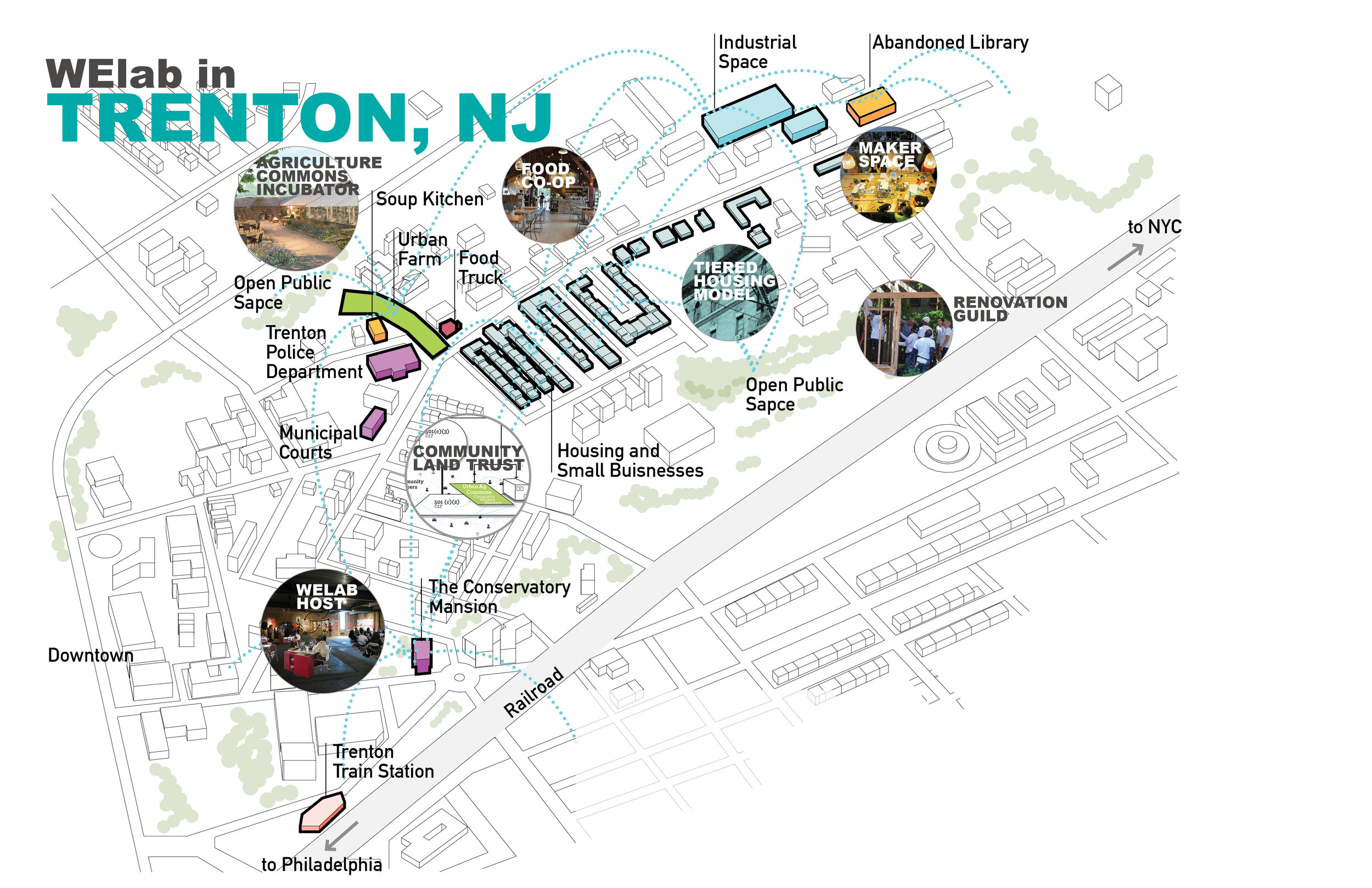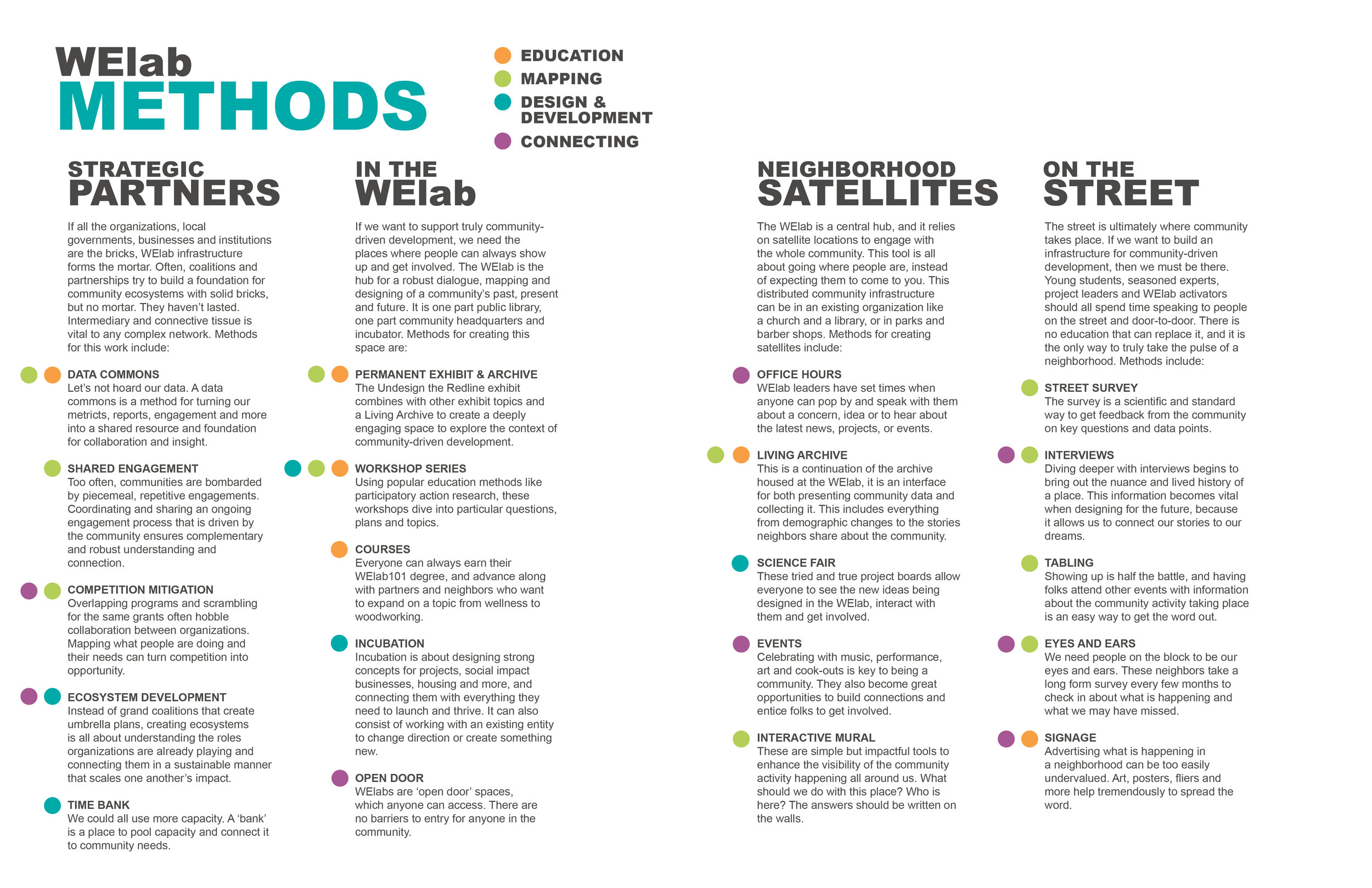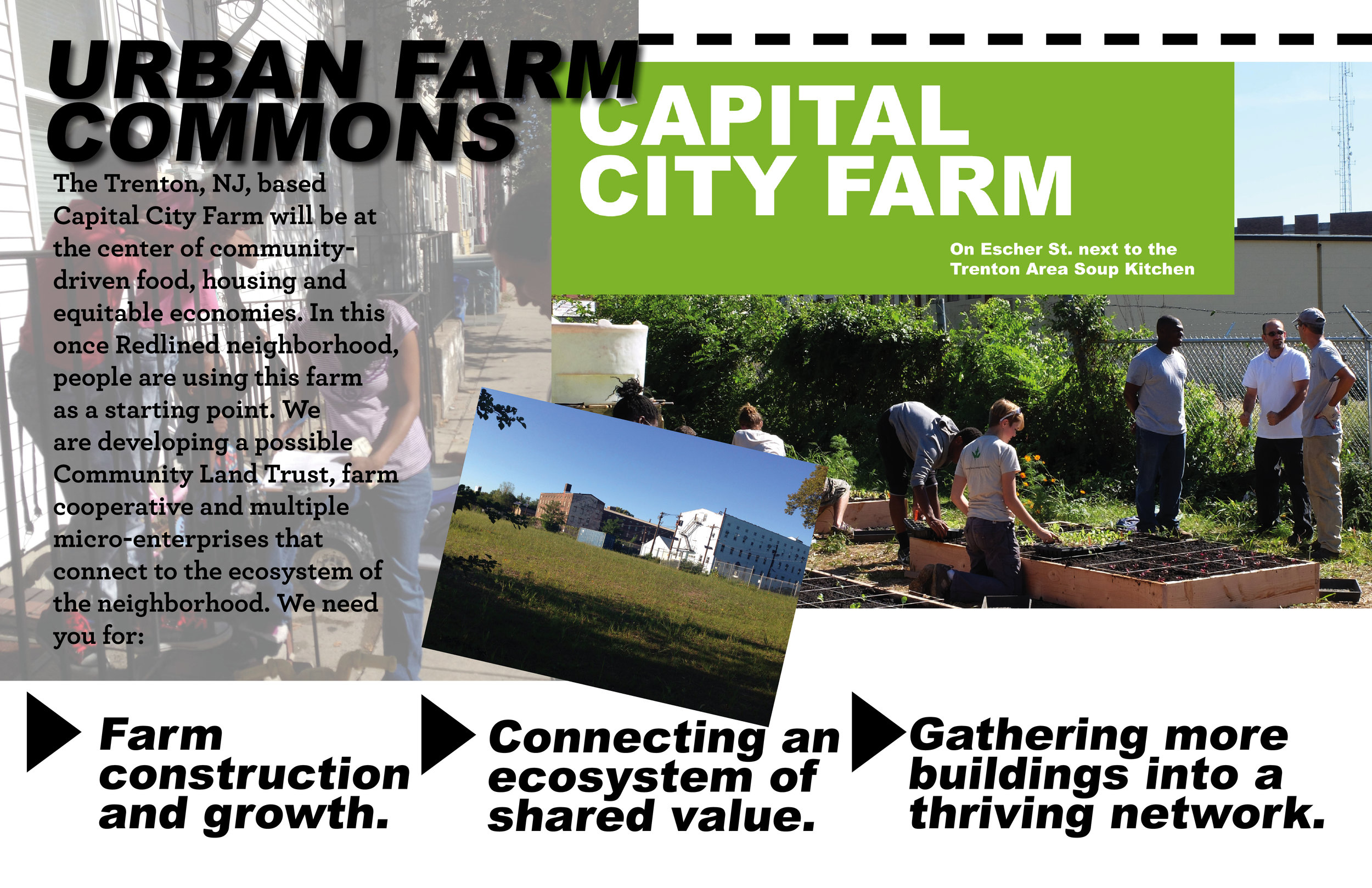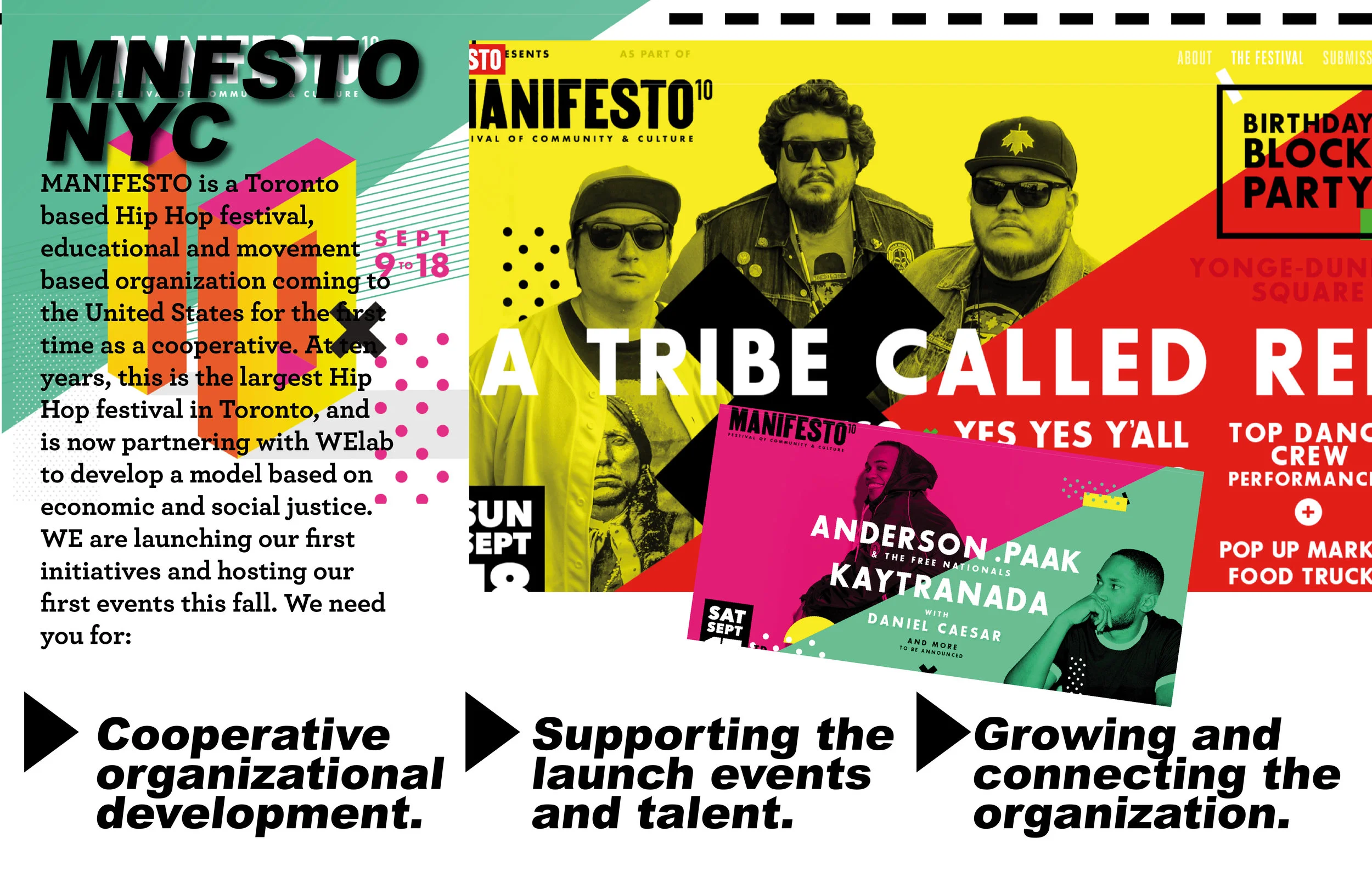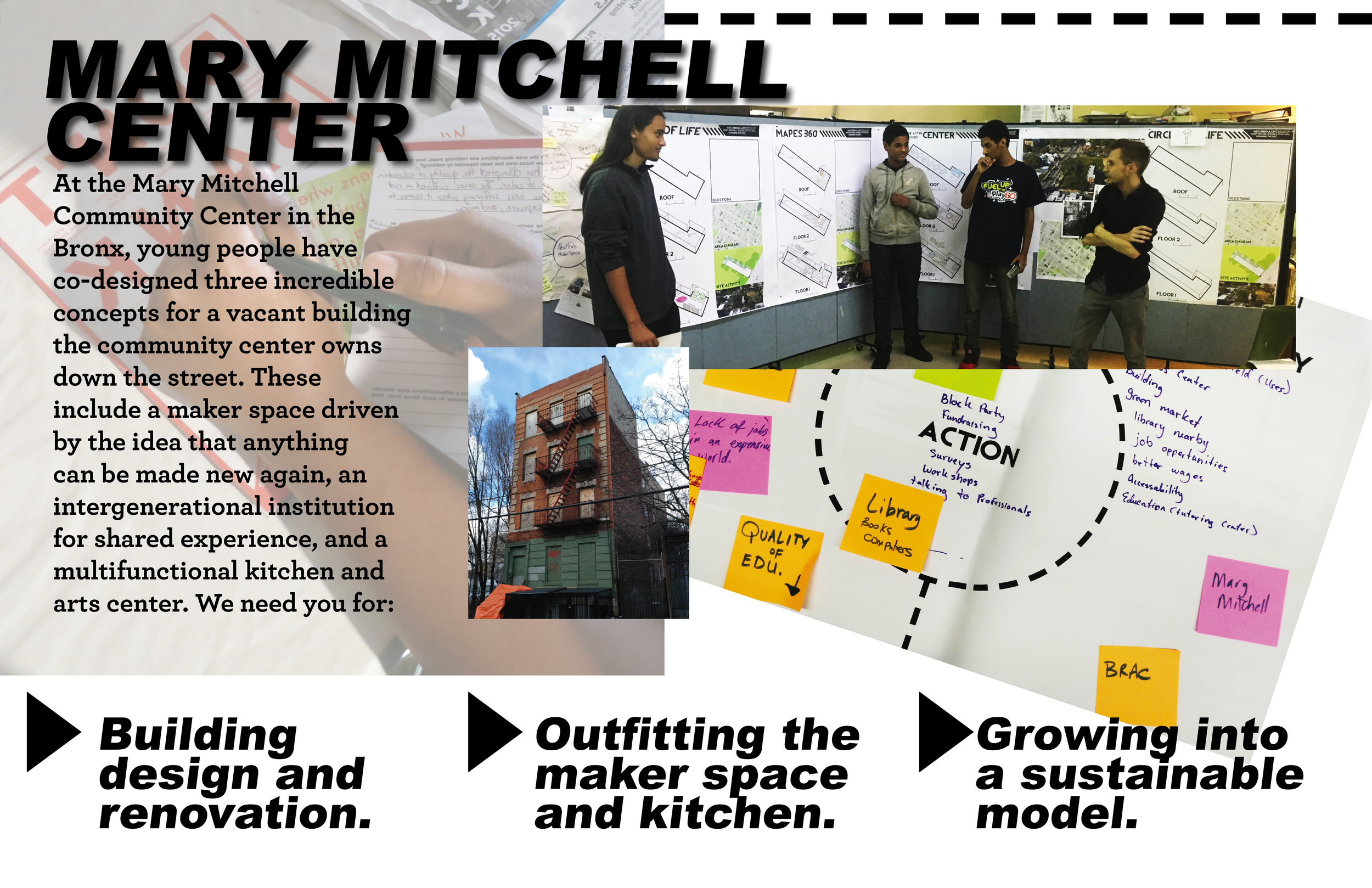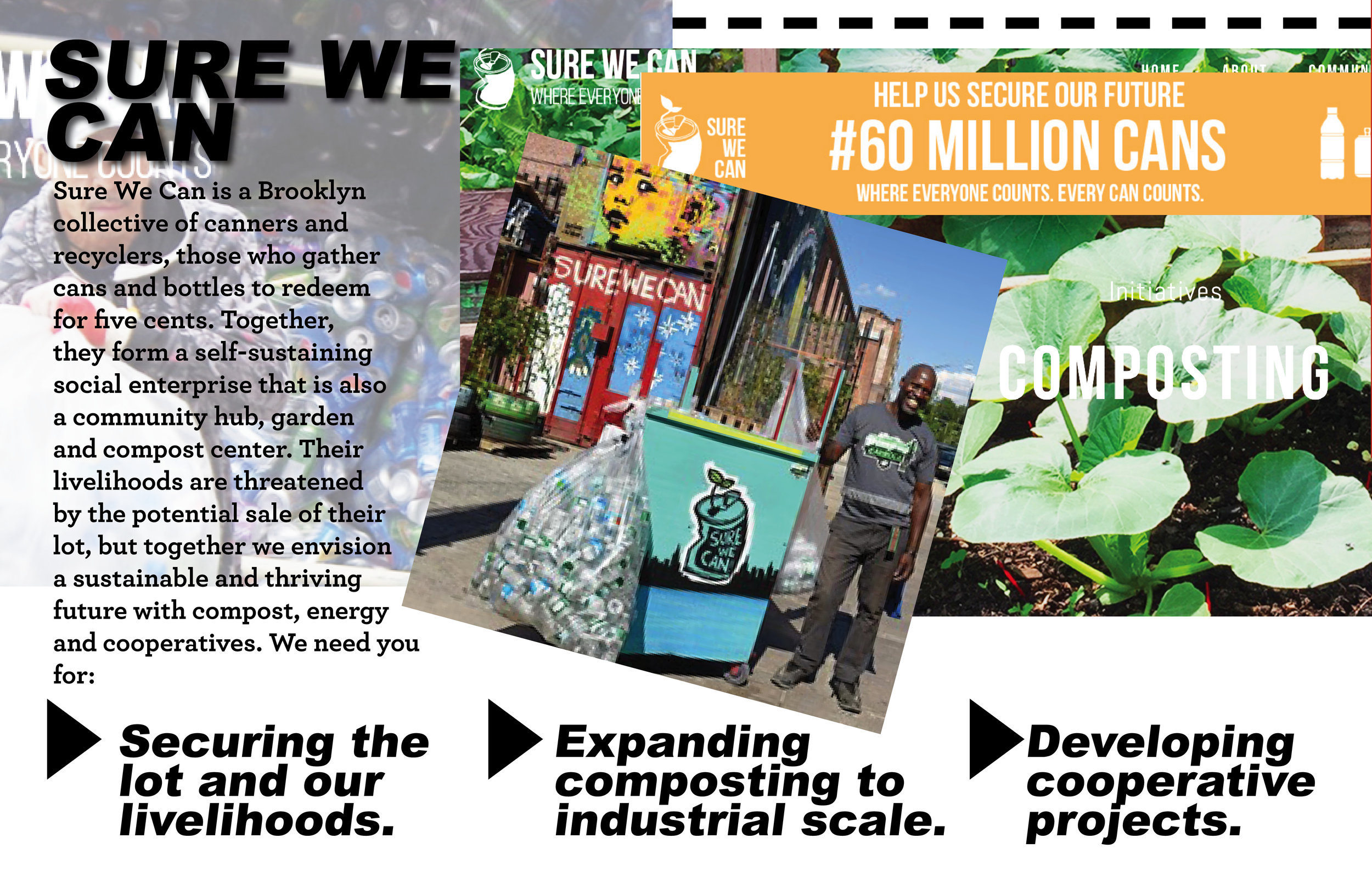WElabs are the places people go to design and develop a shared future.
WElabs are an ecosystem of community hubs where localized knowledge and projects connect neighbors, institutions and professionals. The WElab platform is an infrastructure for generating community-driven social, cultural and economic development. It’s one part incubator, one part community library.
The four main activities of WElab are learning, mapping, designing and connecting.
We learn about shared histories, new systems and from one another. We map community-driven data and measure outcomes. And we design the projects, plans and policies that we implement, test and expand.
The community data that we gather and develop, and the mapping of outcomes, stories and projects, gets collected in a Living Archive. This is a physical and digital platform for understanding where we have come from, where things stand, and what is possible. With this shared knowledge as a foundation, we can begin to design and develop communities from the ground up. WElab brings experts and capacity partners to the table, from lawyers to architects, and vets investment-ready projects that can be connected with resources like social impact investment.
It is this intermediary role of forming connections that makes the building of community ecosystems possible. WElab forms the necessary mortar between the bricks that maximizes the impact of each partner and project with the interconnected outcomes we all seek to achieve.
Operations
WElab nyc
The NYC WElab is located in the historic Andrew Freedman Home on the Grand Concourse in the Bronx. We have hosted participatory salons, workshops and events to develop the process and projects happening there together with community stakeholders. National cooperatives organization 1 Worker 1 Vote, The New School, and CUNY Community Economic Development Law Clinic are partners.
welab trenton nj
The Trenton WElab is located in the deeply embedded Conservatory Mansion, a four-generation Trentonian institution. A participatory process of community engagement based around the Urban Commons farm project has included neighborhood surveys, interviews, pop-up exhibits and multiple workshops. The Watson Institute for Public Policy and My Brother's Keeper are partners.
WElab small towns
WElab Small Towns is a growing initiative to generate local innovation and economies in small towns together with the people and institutions working there. There are currently three potential towns in this network, and a growing number of connections between towns and larger cities. Co-Working space New Leaf Initiative, Texas-based rural sociologists and Smith College are potential partners.
2.living archive
These "public libraries" are the open doors to exploring an ongoing process of community information, mapping, educational tools like the Undesign the Redline exhibit, and for plugging into a boundary-crossing ecosystem.
1.design lab and social hub
Process-driven resources, design and assistance for new and existing initiatives growing in the WElab drives forward an ecosystem of enterprises and projects. This includes digital, physical and cultural infrastructure for advancing shared value objectives.
4.Community Engagement
Participatory Action Research methods involve everything from general surveys, asset mapping and historical research to metrics on topics like community well being, conflicts and social impact. Drawing the community in and sharing local knowledge is key to form the foundation that project, enterprises and stakeholders can constantly draw from to inform what is needed.
3.value system
Shared values are at the core of the WElab ecosystem. Everyone has something valuable to offer, and we respect all for the ways they are different because those differences in experience, talent and background offer something new to everyone else. Because of this, the more we cooperate, collaborate and co-create, the more value we will produce.
6.Enterprises, co-ops, projects
A central function of WElab is forming new and transforming existing projects, shared-value enterprises, co-ops, and institutions that generate returns, drive broad ownership and produce shared value based on the intentions and information driven by communities. These connect with each other into an ecosystem through shared resources, knowledge and networks.
5.WE Curriculum
The WE Curriculum engages students in a process of education and co-creation. In WElab it is paired with an educational tool kit that includes curriculum taught within high schools, partnering institutions and popular education circles that can focus on anything from shared values to technical skills. This builds on and feeds into community data and intentions.
7.strategic partners
Partnerships bring resources, expertise, students and tools into the WElab. The lab sits between these stakeholders, allowing different actors to achieve their goals. This is shared value. WElab allows practitioners to innovate and advance social and economic development through cooperation and social innovation; for institutional partners to advance higher education by shifting from a “diploma only” model into a “career ecosystem”; for movement builders to deepen the understanding and broaden the use of cooperatives across society; for funders to leverage these networks to increase their impact; for communities to produce new processes of intentional citizenship that many projects and stakeholders can plug into; and for all of us to allow these spaces to eventually grow into a self-sustaining and cooperatively owned economic ecosystem.
The Growing Ecosystem of WElab
Institutions and capacity building organizations, embedded local organizations, resource partners, host spaces, and diverse communities generating transformative initiatives that connect into something much larger. You can connect into this ecosystem as well. WE need you.
Our Approach
The crises we face
In the aptly named joint report, “Umbrellas Don’t Make Rain,” we learn that the wealth gap between white and black families at the same levels of education and even income remain staggeringly halved. Wealth is the determinant factor for a myriad of social and economic indicators, but wealth-building has been historically undermined. Policies like Redlining largely cut people of color out of the inter-generational opportunity that home ownership and higher education provided the middle class. Nonetheless, we find that most programs and policies meant to repair this legacy do everything but broadly build wealth: passing out umbrellas when we need rain.
At the same time, traditional models of wealth-building, like home ownership and higher education, are entering crises of affordability, sustainability and adaptability to an evolving economy. Growth in income, wealth and levels of education is uneven across regions of the country and between cities and rural areas. Speculative investment is forcing many out of gentrifying neighborhoods where ownership is unachievable, creating displacement and fraying the social fabric within and between communities. Affordability is compounded by adecades-long wage crisis and growing inequality, leaving many with jobs but no livelihood. From the rise of freelancing to technology advancements and the globalized workforce, the traditional job is becoming less accessible or meaningful to even those with college degrees.
We need to recognize the deep, systemic and entangled nature of all of these issues if we hope to alter their trajectory, which has put us on the path to crisis. But neither the places needed to grapple with these crises exists, nor an infrastructure capable of bringing diverse stakeholders and different knowledges together in addressing them with communities, nor the processes to create the WE that is necessary to move past historic barriers.
Transformative approach
This confluence of factors calls for a shared value approach to wealth-building and life-long education that intentionally takes on historical and contemporary divisions. This transformational approach requires an ecosystem that connects many cooperating players together, as opposed to operating in silos or geographic isolation. We need shared ownership of social innovation that is not top down, but ‘gusher up.’ The more this WE cooperates, collaborates and co-creates, the more transformative impact we will have.
Communities need radically inclusive places to innovate and grow applied models for more than jobs and housing, but shared livelihoods that are also measured through wealth-building ownership, social impact and community well-being. Our approach is to co-create spatial intersections with communities, institutions, students, practitioners and resource partners by (1) creating curated spaces and experiences for community dialogue and action; (2) developing curricula to increase stakeholders’ understanding of cooperatives and shared value ecosystems; (3) incubating entrepreneurial invention and design; and (4) brokering cooperative relationships across communities.
We intend these spaces to grow to eventually become self-sustaining and cooperatively owned. We are driven by a process of social, economic and cultural development based in the needs, assets, dreams and history of everyone who gets involved. And we believe everyone is valuable in this process.



